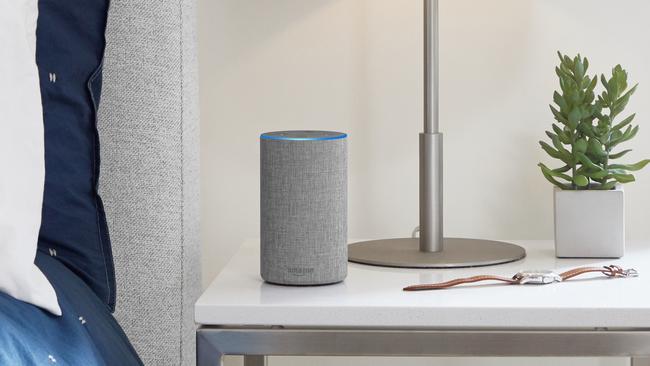Hey, Siri, call me old-fashioned but you can leave us alone now
Sniffing at innovations is a temptation of middle age but surely putting an eavesdropper in your home is a dumb bit of self-bugging.

Within three years, there will be as many virtual-assistant “bots” on earth as people, the industry predicts.
As artificial intelligence is skilfully honed, their slavish behaviour becomes a global addiction. The pioneers — Apple’s Siri and Amazon and Google’s home devices — creep almost unremarked into daily life, not only for early adopters and digital natives.
Children bark orders at the obedient disc in the corner like little imperial nabobs; women discover their inner memsahib and men thankfully embrace the illusion that the golden age of “Yes, Sir” has returned, when a chap could give orders without the troublesome sense that his minion might have feelings. Or a lawyer.
The cleverness of virtual assistants is at first enchanting: moan “Siri, play Seven News” and it saves the terrible labour of tuning in.
Ask that squat cylinder in the kitchen for a weather forecast, takeaway menu, Wagner overture or the date of Waterloo and it obliges. Make a joke or demand one, try out an insult or obscenity: AI will take no offence and expect no gratitude.
Gratitude would be inappropriate anyway, because it is actually you doing a favour to a vast, distant corporation.
Modern IT companies have a track record of blithely launching new products without thorough debugging, and these things need to learn. Organisations gather and analyse what they hear in order to refine the algorithm. But since all human data is gold dust, that helps their bottom line, too.
Jennifer King, director of consumer privacy at Stanford University, admits: “We are basically testing-fodder.”
We are the product.
Novelty blurs the oddity of paying to live with a vigilant inhuman spy linked to an all-too-human corporate profit centre thousands of kilometres away. Stories of their mission creep started with thermostats being changed and orders for unwanted goods placed after overhearing a nearby TV; but there is darker evidence of how trigger-happy “always-on” microphones can suck in conversations.
In Oregon, an Echo device recorded a couple’s chat without their knowledge and sent it to the husband’s colleague in Seattle. Reasonably alarmed, the victims turned it off, since it also controlled the door locks.
In North Carolina, a device sent 20 seconds of conversation for no obvious reason to an insurance agent.
Moreover, to monitor how the service works, all manufacturers send random recordings and transcripts to be analysed by employees around the world. Siri listeners claim to have heard “private discussions between doctors and patients, business deals, seemingly criminal dealings, sexual encounters and so on. These recordings are accompanied by user data showing location, contact details, and app data”. It is all “pseudonymised” and much of it is probably headsplittingly boring, but nothing’s perfect, and we know the trigger word to turn on recording can be accidental (in a theatre a Shakespearean “Sirrah, what news?” once woke an audience’s Siri).
The increasingly popular Amazon and Google devices in the home have equally startling abilities. Last year, a chap in Germany requested his stored data from Amazon and got a 100MB zip file of audio and transcripts belonging to a stranger. A tech magazine listened to the rogue files and was able to build a detailed picture of a man: personal habits, equipment, tastes in music, girlfriend, even sounds of him in the shower. When they tracked him down, he was “audibly shocked” and said Amazon hadn’t informed him of his unwanted broadcasting moments. The company says this was “a human error and an isolated incident”.
But the point is that it was possible. Unease is stirring: this month, a Democratic US presidential candidate in Massachusetts, Seth Moulton, is introducing the “Automatic Listening and Exploitation Act”, wittily titled to spell Alexa. It proposes immediate penalties if a smart device records conversations without the trigger word, and enforcing deletion on request. He wants “a next generation of digital privacy laws”.
That’ll depend on whether anyone truly cares. The commonplace consumer choice to buy a cheap “home hub”, and link it to other appliances for entertainment and even security feels fresh, modern and convenient. Maybe it offers an emotional outlet in our bossed-about society: where else can you snap orders? Or perhaps it indicates the beginning of a larger shift, away from words on a page or screen in favour of oral commands and information. Who knows?
I admit it is a dangerous temptation of middle age to sniff at innovations. We collect examples as warnings: the once serious theory that humans would asphyxiate at 50km/h, Marechal Foch of France saying aeroplanes were “interesting toys of no military value”, or history’s various lordly dismissals of the telephone, nuclear power or personal computers.
Dinosaur reluctance is irritating: we all despaired when in her 80s my mother — a fast typist all her life — refused to embrace email or text, which would have let her chat with her scattered grandchildren.
When I catch myself despising emojis, I rebuke myself. The world must move on. Yet there is an opposite fear of pointing out a glaringly obvious pitfall of progress. So let me risk your contumely by saying that to welcome an ill-regulated corporate eavesdropper into your house is a dumb bit of self-bugging. And that if you ask me round, I shall insist we confine any confidential or slanderous conversation to the garden.
The Times



To join the conversation, please log in. Don't have an account? Register
Join the conversation, you are commenting as Logout